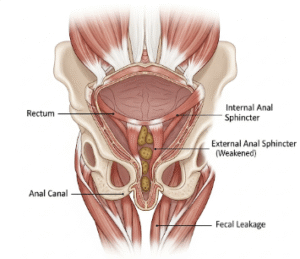Overview
Pelvic Floor Dysfunction (PFD) is a condition in which the muscles of the pelvic floor are weak, tight, or uncoordinated, leading to problems with urination, bowel movements, sexual function, and chronic pelvic pain. It can affect both men and women, although it is more common in women—especially after childbirth or surgery.
What is Pelvic Floor Dysfunction?
Pelvic Floor Dysfunction refers to the inability to correctly relax and coordinate the muscles in the pelvic floor. The pelvic floor supports key organs such as the bladder, rectum, and in women, the uterus. These muscles must work properly for normal urination, defecation, and sexual function. When they do not, symptoms can range from incontinence to pain or pressure.
There are two main types:
- Hypotonic (Weak Pelvic Floor) – Leads to organ prolapse and incontinence.
- Hypertonic (Tight Pelvic Floor) – Causes pain and incomplete elimination.
Symptoms
The signs of pelvic floor dysfunction vary based on the severity and the affected organs. Common symptoms include:
- Urinary incontinence or urgency
- Fecal incontinence or constipation
- Pelvic pain or pressure
- Painful urination or bowel movements
- Pain during intercourse (dyspareunia)
- Incomplete emptying of the bladder or bowels
- Muscle spasms in the pelvis
- Lower back or hip pain
Causes
Pelvic Floor Dysfunction can develop due to various causes, including:
- Childbirth trauma (especially vaginal delivery)
- Pelvic surgery (e.g., hysterectomy, prostatectomy)
- Chronic constipation and straining
- Heavy lifting or high-impact exercise
- Aging and menopause
- Obesity
- Neurological disorders (e.g., stroke, multiple sclerosis)
- Trauma or injury to the pelvic area
- Repetitive stress (e.g., chronic coughing or sneezing)
Risk Factors
Several factors increase the risk of developing pelvic floor dysfunction:
- Multiple vaginal births
- Pelvic organ prolapse
- Obesity or being overweight
- Advancing age
- Chronic constipation or straining
- Connective tissue disorders
- Previous pelvic injury or trauma
- Sedentary lifestyle
- Psychological stress or anxiety
Complications
If left untreated, Pelvic Floor Dysfunction can lead to:
- Reduced quality of life due to pain and incontinence
- Sexual dysfunction
- Chronic pelvic pain
- Social anxiety or embarrassment
- Worsening of organ prolapse
- Urinary tract infections
- Sleep disturbances
Prevention
While some cases of PFD cannot be prevented, the following strategies may help reduce the risk:
- Pelvic floor exercises (Kegels), especially during and after pregnancy
- Avoid straining during bowel movements
- Maintain a healthy weight
- Stay active with core and pelvic-strengthening activities
- Treat chronic coughing or constipation promptly
- Practice good posture and body mechanics
- Limit heavy lifting
- See a pelvic health specialist early if symptoms arise
Treatment Options in Korea
South Korea offers cutting-edge diagnostics and evidence-based therapies for Pelvic Floor Dysfunction through a multidisciplinary approach, including gynecology, urology, physiotherapy, and surgery.
1. Diagnosis
- Pelvic exam by a gynecologist or urologist
- Ultrasound or MRI of the pelvic region
- Urodynamic testing
- Defecography for bowel-related issues
- Manometry to assess muscle strength and coordination
2. Non-Surgical Treatments
- Pelvic Floor Physical Therapy: Core component of treatment, including muscle re-training, biofeedback, and relaxation techniques
- Biofeedback Therapy: Helps patients learn to control pelvic floor muscles
- Electrical Stimulation: Stimulates muscle contraction for strengthening
- Medications:
- Muscle relaxants for tight pelvic floor
- Laxatives or stool softeners for constipation
- Topical estrogen for postmenopausal women
- Behavioral therapy and bladder retraining
- Counseling for psychological factors
3. Minimally Invasive Procedures
- Botox injections for hypertonic pelvic floor
- Nerve stimulation therapy (e.g., tibial or sacral neuromodulation)
4. Surgical Interventions (for severe cases)
- Pelvic organ prolapse repair
- Sling procedures for incontinence
- Colorectal or gynecologic surgeries (if structural issues exist)
5. Rehabilitation and Support
- Long-term physiotherapy
- Lifestyle coaching
- Psychological support (especially for chronic pain and anxiety)
Many premier medical centers in Korea like Asan Medical Center, Samsung Medical Center, and Yonsei Severance Hospital provide specialized pelvic floor clinics equipped with state-of-the-art technology and experienced female health specialists.













